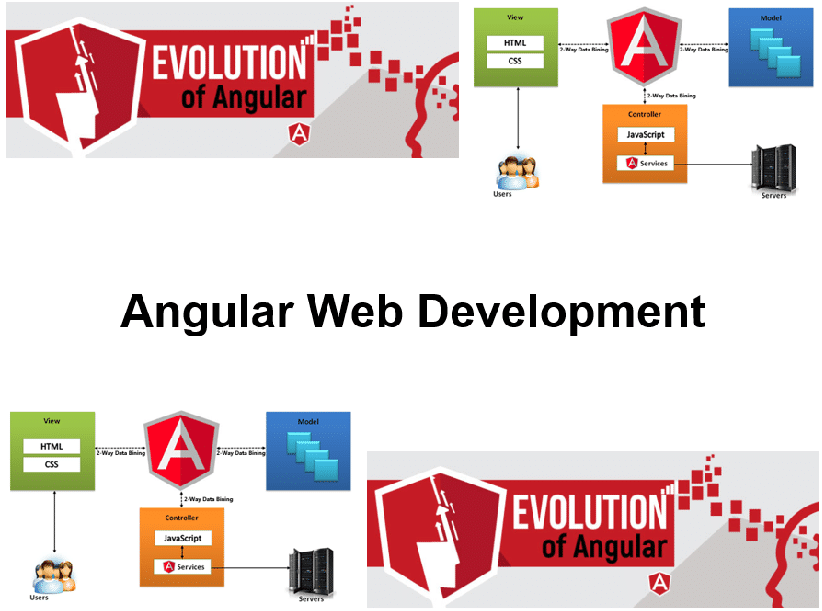-
Learning by doing
-
Trainers with practical experience
-
Classroom training
-
Detailed course material
-
Clear content description
-
Tailormade content possible
-
Training that proceeds
-
Small groups
In the course Angular Web Development participants learn to use the Angular JavaScript Framework to develop modern single page Web Applications. The course covers the latest Angular version, version 9 at the time of writing.
The Angular Framework is a major upgrade of the AngularJS 1.x JavaScript Library, offers better performance and uses TypeScript and the new features of the ECMA 6 JavaScript standard.
In the course participants learn the architecture of an Angular application in which a collection of components cooperate together in modules.
Attention is paid to the components such as templates, annotations, views and services. Dependency injection is also discussed. The syntax of TypeScript and the new JavaScript standard ECMA 6 is covered.
The significance of Angular CLI and the generation of artifacts as components and services and the function of the dependency injector tree to keep applications extendable and maintainable are also discussed.
Attention is also paid to the new component router for basic routing, child routes and router lifecycle hooks. Forms are also on the program where template-driven forms, model-driven forms and validators are discussed.
Observables open the door to reactive functional programming and their function is demonstrated when making HTTP requests with the new HTTP layer. Finally, the participants learn to build new reusable user interface components.
Web Developers who want to use the latest version of the Angular JavaScript Framework, at the time of writing, Angular 9, when developing modern single page Web Applications.
JavaScript programming experience and a good knowledge of JavaScript is required to participate in this course.
The theory is treated on the basis of presentation slides. The concepts are illustrated with demos. The theory is interspersed with exercises. The course times are from 9.30 to 16.30.
The participants receive an official certificate Angular Web Development after successful completion of the course.

Module 1 : Intro Angular |
Module 2 : TypeScript |
Module 3 : ECMA Script 6 |
| What is Angular? Newest Features Angular Development Environment Bootstrapping an app Displaying data Using Directives Templates Annotations Views Controllers Modules |
What is TypeScript? Weak typing in JavaScript Strong Typing in TypeScript Using Built-in Types Inferred typing Explicit casting Classes Interfaces Decorators Generics Sync and await |
Block Bindings Let Variables Arrow Functions Rest Parameters Spread Operator Strings Functions Closures Iterators Promises Reflection |
Module 4 : Components |
Module 5 : Dependency Injection |
Module 6 : Routing |
| Component Architecture Inputs and Outputs Data flow Smart vs. Dumb components Communicating via state service Custom event bus Reusable UI Components Querying view children Querying content children Host Bindings and Listener |
What is dependency injection? Writing Imports Creating services DI for component communication Configuring providers Defining provider recipes The injector tree Injecting using tokens Opaque tokens Multi Providers |
Angular Routes Routing Configuration Route comparison Routing Parameters Configuring routes Linking to routes Guards Child routes Sibling routes Lazy loading routes |
Module 7 : Forms |
Module 8 : HTTP and Observables |
Module 9 : Angular CLI |
| Template-driven forms Model-driven forms Tracking Changes by CSS Control ControlGroup FormBuilder Validation Validation Styling Error messages Custom validators Asynchronous validators |
Performing HTTP requests Configuring request headers HttpClientModule. RxJS 6 Observables Observer Design Pattern Observables versus Promises Creating Observables Creating Subjects Emitting events Subscribing to observables Observable Operators |
What is Angular CLI? Modern tooling Generate with CLI Directives and services Compile, run with CLI Deploy your applications. Generating components Generating services Transpiling TypeScript Building and serving apps Debugging |
